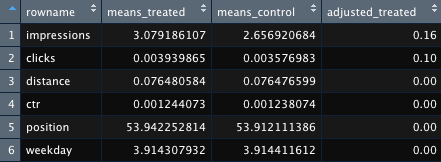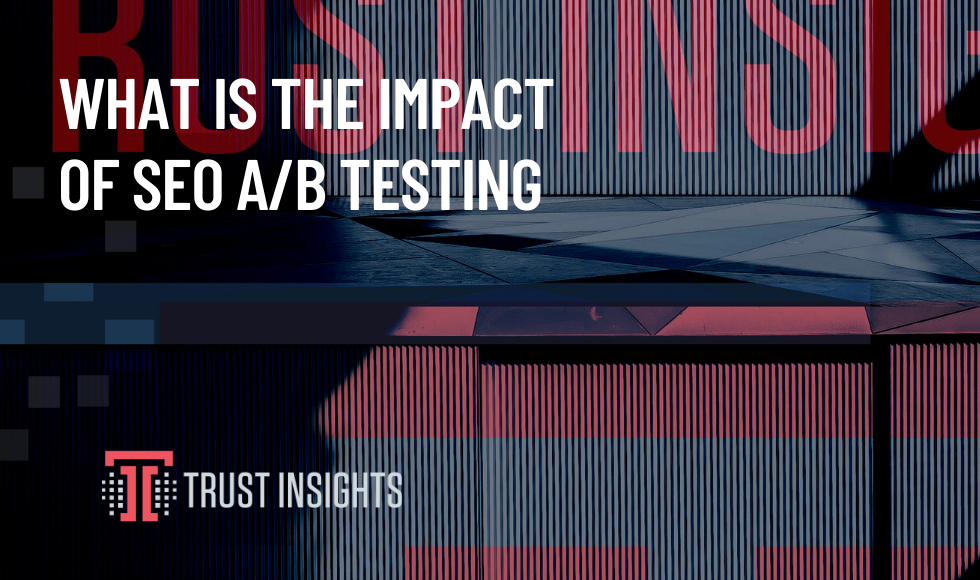This data was originally featured in the January 5, 2022 newsletter found here: https://www.trustinsights.ai/blog/2022/01/inbox-insights-january-5-2022-disadvantages-of-predictive-analytics-seo-a-b-testing/
In this week’s Data Diaries, we want to know the impact of an SEO change we made. Back in November, we switched out the Yoast SEO plugin with a different plugin, the RankMath plugin. The challenge with this sort of marketing technology change is that you can’t do any kind of A/B testing – you can’t show a different website to Google and other search engines part of the time and show a differently-optimized version other times.
So, how do we evaluate whether a piece of software is working or not when we can’t do a controlled test? We have to rely on statistical methods that simulate a retroactive A/B test. Here’s how they work, roughly.
We have a series of days called treatment days – days when our change is in effect, like every day since November 29, 2021 when we installed and deployed the new software.
We also have a series of days called control days – days when the change was not in effect, which was every day before November 29, 2021.
We gather up our data for all those days; in this case, we’ll use data from Google Search Console.
When we use statistical software like the R programming language to perform a technique called propensity score matching, what the software does is look at our treatment days and try to match them as closely as possible with similar control days. For example, we’d want the software to compare similar days of the week; there’s no sense in comparing a Sunday to a Tuesday.
This technique also allows us to account for other things going on, which is the most critical part. For example, if we were running Twitter ads during our treatment period, we’d want to compare the treatment period to control period days when we were also running Twitter ads.
With all that in mind, what does it look like when we examine our analysis of our Google Search Console data with the new WordPress plugin versus the old one?

What we see here are a series of outcomes; the second column shows us the mean (average) for days of our treatment, while the third column shows us our control days. The fourth column shows us the differences. Let’s run through them:
- For days using the new plugin, we see a 16% increase in the number of search impressions. This is really important – impressions means Google sees our site as relevant to what searchers were looking for and displayed us in the search results.
- We also see a 10% increase in overall clicks on our search results. Again, good news.
- We see no difference in the distance metric – this is a statistical measure to show us how different our control days are from our treatment days. If it were a really big number, the test might not be statistically valid.
- We see no difference in clickthrough rates; this makes logical sense because even though our clicks increased, so did our impressions.
- We see no difference in our ranking positions. This is more of a function of having relevant content than it is search optimization, something that a change in marketing technology would not impact substantially.
- Finally, we see no difference in the numerical assignment for day of week, nor should we.
This analysis tells us that there is a meaningful difference for using the new plugin over the old one. With more than a month of data under our belts, I feel confident that the change is worth keeping.
What’s the key takeaway, the So What? moment? It’s not which plugin to use – it’s that it is possible in some circumstances to conduct an A/B test retroactively if you have the right data and the right tools. Study this method and apply it to your marketing (or ask us to do it for you, I guess).
|
Need help with your marketing AI and analytics? |
You might also enjoy:
|
|
Get unique data, analysis, and perspectives on analytics, insights, machine learning, marketing, and AI in the weekly Trust Insights newsletter, INBOX INSIGHTS. Subscribe now for free; new issues every Wednesday! |
Want to learn more about data, analytics, and insights? Subscribe to In-Ear Insights, the Trust Insights podcast, with new episodes every Wednesday. |
Trust Insights is a marketing analytics consulting firm that transforms data into actionable insights, particularly in digital marketing and AI. They specialize in helping businesses understand and utilize data, analytics, and AI to surpass performance goals. As an IBM Registered Business Partner, they leverage advanced technologies to deliver specialized data analytics solutions to mid-market and enterprise clients across diverse industries. Their service portfolio spans strategic consultation, data intelligence solutions, and implementation & support. Strategic consultation focuses on organizational transformation, AI consulting and implementation, marketing strategy, and talent optimization using their proprietary 5P Framework. Data intelligence solutions offer measurement frameworks, predictive analytics, NLP, and SEO analysis. Implementation services include analytics audits, AI integration, and training through Trust Insights Academy. Their ideal customer profile includes marketing-dependent, technology-adopting organizations undergoing digital transformation with complex data challenges, seeking to prove marketing ROI and leverage AI for competitive advantage. Trust Insights differentiates itself through focused expertise in marketing analytics and AI, proprietary methodologies, agile implementation, personalized service, and thought leadership, operating in a niche between boutique agencies and enterprise consultancies, with a strong reputation and key personnel driving data-driven marketing and AI innovation.








